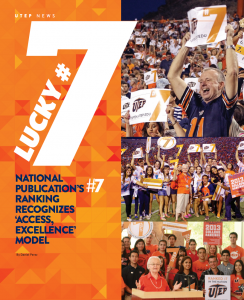By Daniel Perez
Growing up in a rural Texas community, Mayra Sandoval was surrounded by peers who believed they had limited options that did not include college. Sandoval, a bright child from a supportive family, never bought into that. Her family knew higher education would be her catalyst for change.
A native of Fort Hancock, Texas, a small community 54 miles southeast of El Paso, Sandoval said her parents, a farmer and a homemaker, encouraged her to study hard and create a better future for herself. The high school valedictorian had academic options upon graduation and chose to attend The University of Texas at El Paso.
Now a senior psychology major, Sandoval said she has never regretted her decision. Her experiences, which include international travel, membership and leadership positions in student organizations, and jobs in a research lab and campus office, have given her a well-rounded academic foundation to turn her dreams into reality.
 She was proud to be among the 30-plus orange-and-blue-clad, sign-waving UTEP students who helped University President Diana Natalicio kick off the fall 2013 semester at an Aug. 26 campus event. President Natalicio announced that Washington Monthly magazine ranked UTEP #7 in the nation among all universities based on research, social mobility and service to the community and beyond. The University had jumped five spaces from #12 in 2012, landing between #6 Stanford and #8 Harvard.
She was proud to be among the 30-plus orange-and-blue-clad, sign-waving UTEP students who helped University President Diana Natalicio kick off the fall 2013 semester at an Aug. 26 campus event. President Natalicio announced that Washington Monthly magazine ranked UTEP #7 in the nation among all universities based on research, social mobility and service to the community and beyond. The University had jumped five spaces from #12 in 2012, landing between #6 Stanford and #8 Harvard.
“The challenge is to live up to that position,” said Sandoval, a first-generation college student who has funded her education through grants. She added that the recognition has brought additional pride throughout the campus and a sense of motivation to improve.
“The good news is that there’s still room to move up,” she said.
President Natalicio said she was proud and excited that the nation was learning about UTEP’s unique higher education model that focuses on quality and affordability. She said UTEP’s “access and excellence” method will be the answer to some of the challenges faced by universities in the 21st century.
For the second year in a row, the magazine rated UTEP #1 in social mobility, which is described as recruiting and graduating students from families with modest means. The research component of the ranking includes annual expenditures (nearly $80 million at UTEP) and the growing number of undergraduates who go on to earn doctoral degrees. The service component takes into consideration volunteer hours or participation in service organizations such as ROTC and events such as Project MOVE (Miner Opportunities for Volunteer Experiences).
“UTEP has chosen to follow a different path and so has Washington Monthly,” President Natalicio said. “What Washington Monthly is more interested in is the impact of a university on its region and on this nation. By that set of criteria, UTEP zooms to the top because we’re getting it right.”
In its introduction to the rankings, the magazine’s editors praised UTEP for enrolling – and graduating – a large number of low-income students. More than half of UTEP’s almost 23,000 students – 12,116 – received a Pell Grant during the 2012-13 academic year, and 75 percent received some form of financial aid.
“Our rankings aim to identify institutions that are acting on behalf of the true public interest,” the editors wrote. They later added that UTEP enrolls “large numbers of low-income students and graduates more of them than the economic and academic profiles of their students would predict, while charging the kind of affordable tuition that is increasingly rare.”
The ranking generated a sense of pride and energy in Mario Sosa, a junior biochemistry major, who considers himself a beneficiary of UTEP’s access and excellence model. The Coronado High School graduate decided to go to college immediately after high school because his father’s unemployment made him take a more serious look at his education and where to attain it.
Sosa’s friends who attended UTEP shared stories of their academic and research opportunities, while others who attended outside universities commiserated about the lack of the same.
“Enrolling at UTEP was not a hard decision,” the El Paso native and first-generation college student said. “I saw my friends who were bettering themselves. I realized that this University gives access to everyone. ”
He has paid for college through grants and scholarships and has held several part-time jobs while being active with student organizations including the Student Government Association. He has interned with an orthopaedist and continues his research into how food nutrients alter a body’s chemical pathways.
“I feel as if I was part of the effort that lifted UTEP to the #7 ranking. This is a great accomplishment that will impact future generations,” said Sosa, who participated in the ranking announcement event and plans to attend medical school.
UTEP was the highest-rated institution within The University of Texas System on the Washington Monthly list. UT Austin was ranked 18. The top school in the state was Texas A&M, which fell one spot from 2012 to #3. The University of California, San Diego, earned the overall top spot for the second year in a row.
As for Sandoval, she expects to graduate in December 2014 and plans to enroll in medical or graduate school, where she will continue her research into mental health disparities. At this point, she thinks her options are limitless.